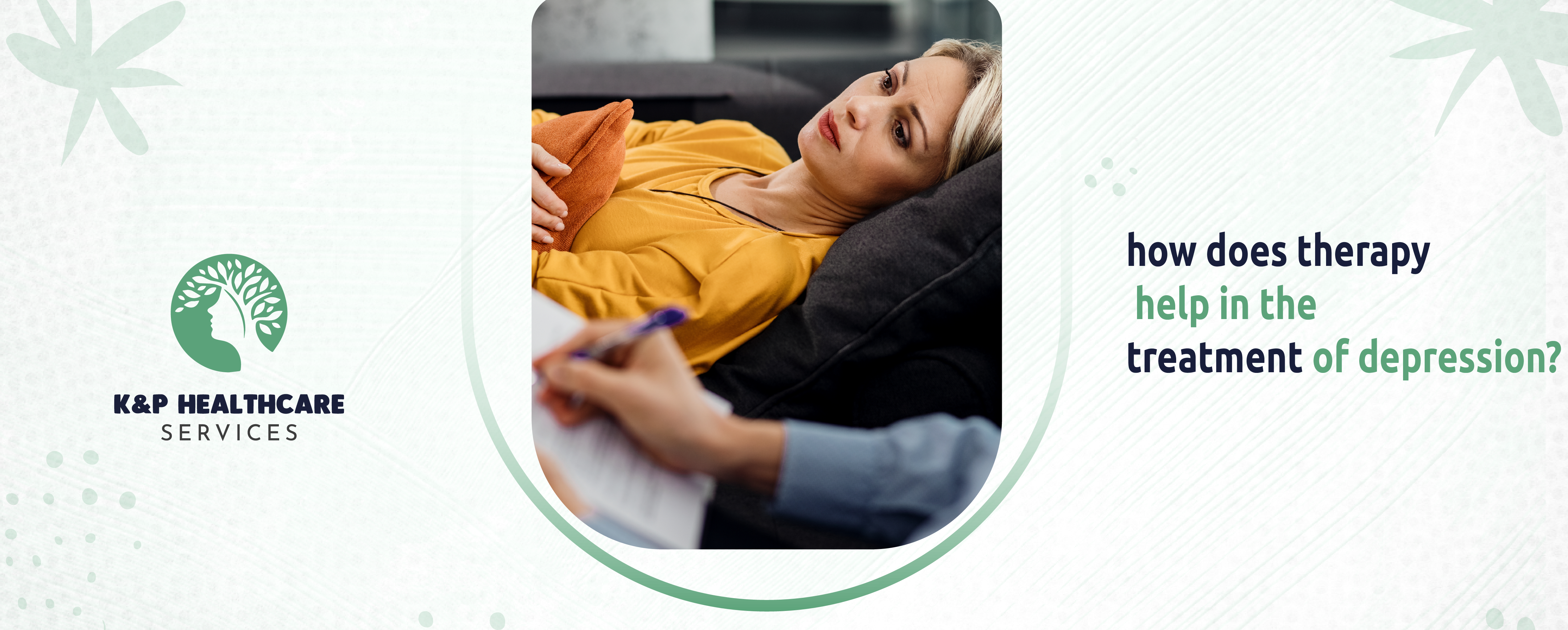Depression is a grave mental health issue, affecting many globally. It can change someone’s feelings, thoughts, and daily habits.
Thankfully, psychotherapy is a strong approach for managing depression. In this blog post, we will explore how does therapy help in the treatment of depression.
We’ll look into different therapy styles, treatment methods and guide you towards the right help.
Depression: What is It?
Depression is not just feeling sad or having bad days. It’s a long-term condition that can cause significant discomfort and disrupt life’s various aspects.
Usual symptoms are:
- Ongoing sadness or reduced mood.
- Lack of interest in previously enjoyed activities.
- Changes in appetite or weight.
- Trouble sleeping.
- Low energy levels.
- Difficulty focusing.
- Negative self-perception or constant guilt.
These symptoms vary in severity and usually need professional help for effective handling.
How Does Therapy Help in the Treatment of Depression
Treatment for depression often includes therapy. It is a comforting place where people can reveal their emotions, analyze their thoughts, and develop ways to deal with their issues. So how does therapy help in the treatment of depression? Here’s how:
-
Emotional Support and Validation
Therapy is essential because it provides emotional care. Therapists create a space free of judgment where people can freely express their emotions.
This sense of emotional validation can be very comforting and can make people feel less alone and more understood.
-
Recognizing and Modifying Negative Thinking
Cognitive-behavioral therapy (CBT) is highly beneficial for managing depression. It aids people in identifying and modifying harmful thought cycles that enhance depressive feelings.
By rethinking these thoughts, people can lessen their depression symptoms and improve their frame of mind.
-
Developing Coping Strategies
Therapy helps people build strong coping strategies. It helps tackle stress and emotional hardships. Therapists teach techniques like mindfulness, journaling, and relaxation.
These therapeutic activities for depression aid in lowering the symptoms, and boost overall health.
-
Building Resilience
Therapy assists people in developing resilience. It instructs them on how to recover from difficult situations. They gain the ability to approach hardships positively and remove hurdles.
-
Enhancing Self-awareness
Therapy promotes self-reflection. It helps people understand their feelings and actions on a deeper level.
As a result, therapy boosts the power of individuals to identify triggers and patterns possibly leading to their depression.
They are then able to make informed decisions regarding their mental health.
Types of Therapy for Depression
There are diverse therapy methods for depression. Here are a few:
Cognitive-Behavioral Therapy (CBT)
(CBT) is a planned, limited period therapy. It studies the links between thoughts, feelings, and actions. This therapy type is very useful for helping people replace negative thinking and adopt healthier habits.
Interpersonal Therapy (IPT)
IPT improves interaction and communication. Miscommunication can sometimes cause depression. IPT helps in dealing with relationship conflicts and in creating a supportive friend circle.
Psychodynamic Therapy
This type of therapy explores unconscious thoughts and past issues that can help with depression. This approach helps people understand their feelings and remember their history, which helps them heal.
Treatment Plan Goals and Objectives for Depression
An effective plan with clear goals is key to handle depression well. It offers a recovery guide and tracks the improvements. Common goals in such plans include:
- Reducing Symptoms: The main focus is to lessen depression symptoms. This goal can be met through methods like cognitive-behavioral therapy (CBT) to alter negative thought processes, and mood-stabilizing medication.
- Improving Daily Functioning: Depression can upset daily routines. It’s important to improve efficiency at work, school, or home. This step may involve establishing fixed routines and maybe mixing in occupational therapy.
- Building Emotional Health: It’s critical to develop emotional strength. Coping skills, mindfulness, and calming practices can nurture emotional wellness. A treatment plan with these goals needs a rounded approach, including therapy, medication, and lifestyle changes.
Collaboration between the patient and healthcare professional is vital, ensuring that the plan suits specific needs and is regularly fine-tuned for the best outcomes.
Treatment Settings for Depression
Treatment for depression has different forms based on how severe the depression is and what the person needs. Finding the best match is essential for successful therapy.
Outpatient Treatment for Depression
Outpatient treatment for depression involves regular therapy sessions at a clinic or therapist’s office. This option is suitable for mild to moderate depression cases, allowing for routine tasks while undergoing treatment.
Intensive Depression Treatment
For those with more severe depression, intensive depression treatment programs give a higher level of care. These programs might have frequent therapy sessions, group therapy, and medication management to give a full support system.
In Patient Depression Treatment
In patient depression treatment means living in a care center. This allows someone to get help round-the-clock. It’s good for those with serious depression or when they have other issues as well, needing a lot of watchfulness and aid.
Finding the Right Therapy
Getting the right therapist and treatment setting is key for managing depression well. Consider the following advice:
- Begin with Internet Search: Start by searching for ‘depression clinics near me’ on the web to discover nearby help and experts who concentrate on depression treatment.
- Consult with Mental Health Professionals: Have a conversation with mental health professionals to evaluate your symptoms and explore different treatments.
- Think About What Suits You: Reflect on the kind of therapy and environment you would find most soothing.
Next Steps: Get Mental Health Care at K&P Healthcare Services
Knowing how does therapy help in the treatment of depression is key to recovery.
Therapy equips you with helpful strategies and encouragement to conquer depression. If you or someone you care about battles with depression, think about contacting a professional.
We at K&P Healthcare Services provide full mental health support. We have a team of professionals, providing diverse therapy choices customized to personal preferences.
By reaching out to us now, you begin a journey towards a happier tomorrow. Let us assist you on your path to healing and enhanced health.
FAQs
-
How does therapy help people with depression?
Therapy is a huge help for those grappling with depression. It offers a secure space where they can share feelings. It also helps replace negative thoughts with positive ones and teaches response techniques for handling stress and feelings.
-
How does therapy help in the treatment?
It digs into depression’s root causes, enhances control over emotions, and boosts better relationships and conversations. Therapy equips people with ways to tackle life’s hurdles effectively.
-
How do I know if therapy is helping?
Signs like mood uplift, extra energy, enhanced sleep, and lessened depression signs hint at progress. Regular check-ins about progress with your therapist can help gauge therapy’s success.
-
How does therapy make you better?
It amps up self-awareness, builds coping approaches, and boosts resistance. It assists personal development and helps forge a positive life perspective.
-
What is the best treatment for depression?
The optimal depression treatment is a blend of therapy, medication, and lifestyle modifications. Cognitive-behavioral therapy is commonly used, but the best method depends on personal needs.






No comment